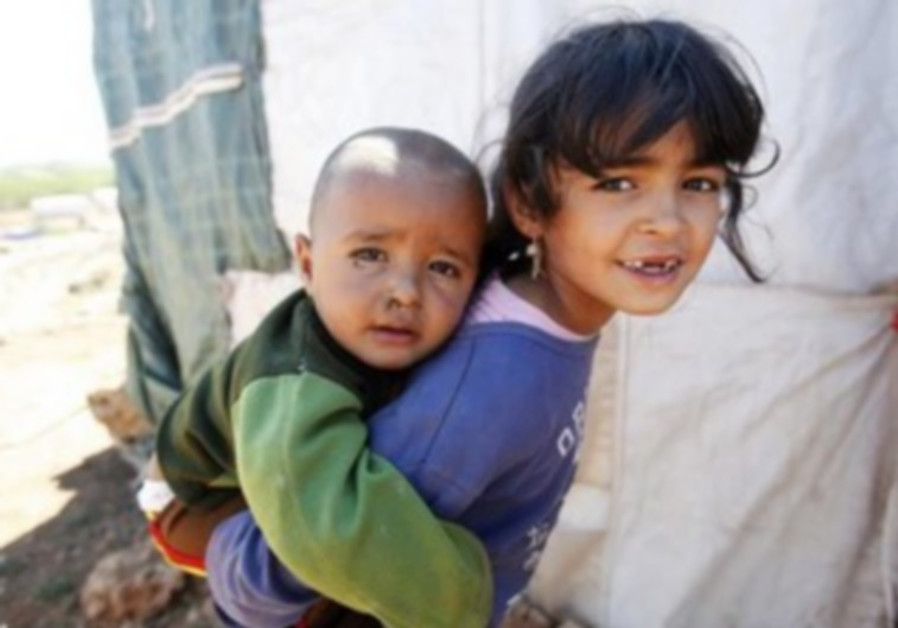“I said my name is Gal, and I came from Israel. I am an Israeli and a Jew, and I care for you.”

The Israeli NGO Israel Flying Aid has been providing humanitarian aid to Syrians for years through a “full undercover unit of all native Arabic speakers,” Gal Lusky, the head of the organization, said Monday.
In the last few days, the NGO has gone public following reports that the IDF carried out a mission last Thursday night – with the group’s help – to deliver massive amounts of humanitarian aid to refugees fleeing Syrian President Bashar Assad’s forces in southwestern Syria.
Lusky, in a conference call put together by The Israel Project, said her organization has been “really busy” with the IDF, providing aid on a weekly basis to Syrian refugees over the last two years.
She said Israel Flying Aid specializes in delivering aid to countries that do not have diplomatic ties with Israel.
According to Lusky, the NGO has three units working around the world.
“We have a visible Israel Flying Aid unit with our logo and name on it, and are always proud to do that,” she said.
“In countries hostile to Israel, we use a unit that uses a different name and logo that works under a cover story of a European mission.
“And in an enemy country like Syria we have a full undercover unit, all native Arabic speakers – these people are fully committed to saving lives, as reflected in the Jewish culture and religion.”
Lusky said it was not “natural” to operate in Syria, something they have done since 2011.
“We have operated in Pakistan, Sudan, Iraq and more, but this thing in Syria was not so natural,” she said, explaining that the main concern was that “if something ever happened to us, it might drag the whole Israeli government and civilians into being blackmailed, and that was the last thing we wanted to do.”
During the first three years of operations in Syria, she said, even the Syrians that the organization was working with did not know the true identity of the group.
“One night we suffered bombings in a joint convoy with Kurdish troops in northern Syria, and I personally decided to step forward with my identity and allow them to choose if they want to collaborate with Israel in the future or not,” she said.
The first reaction of the Syrians she was working with was very harsh, she said, relating an incident where she revealed her true identity.
“It was in one of the neighboring countries with Syria. There were two generals belonging to the Free Syrian Army, and two diplomats from a political party belonging to the opposition,” she recalled.
“I felt I needed to open with an apology, so I said: “Listen, I owe you an apology, because throughout the last year we have been working together very tightly, but I needed to technically lie to you. I am not who you think I am.”
Lusky said she then removed her hair covering and for the first time her interlocutors saw her full face.
“I said my name is Gal, and I came from Israel. I am an Israeli and a Jew, and I care for you.”
She said one of the general’s immediately started to scream and said, “Now I understand – you are not my friend, you are my enemy! So let me tell you one thing: I am going to finish with [Syrian President Bashar] Assad, and you are next.”
Lusky said she replied by saying that she agreed with him about removing Assad, and added, “I strongly believe you should live in the same conditions and security and prosperity as we do next door, and that’s what the beginning of the revolution [in Syria] was all about.”
She said last week Israel supplied massive amounts of tents, baby formula, medication, food items and hygiene sanitation kits to the refugees. But, she said, the weight of the humanitarian assistance cannot solely rest on Israel’s shoulders, even though Israel is a gateway to access the Syrians fleeing the Deraa region.
If she had just “five seconds” with US Ambassador to the UN Nikki Haley, Lusky said she would recommend redirecting funds that the US once paid to the UN Human Rights Council – which it quit last month – to aid the Syrian refugees via Israel.
Lusky said she did not think Israel should open its northern border to the refugees. What it should do, she recommended, is ensure that there was a wide enough buffer zone across the border – which would be protected – that would “allow these people to stay among their own people and be able to get access” to international humanitarian aid.
As reported by The Jerusalem Post
